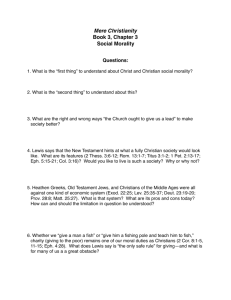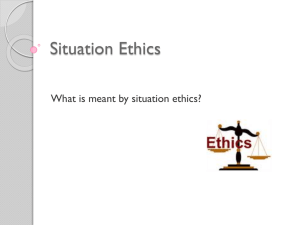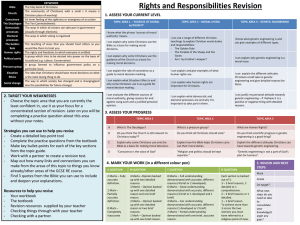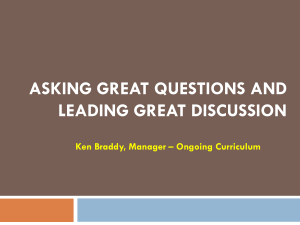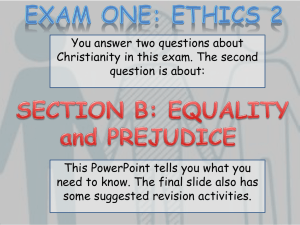Rights_&_Responsibilities
advertisement
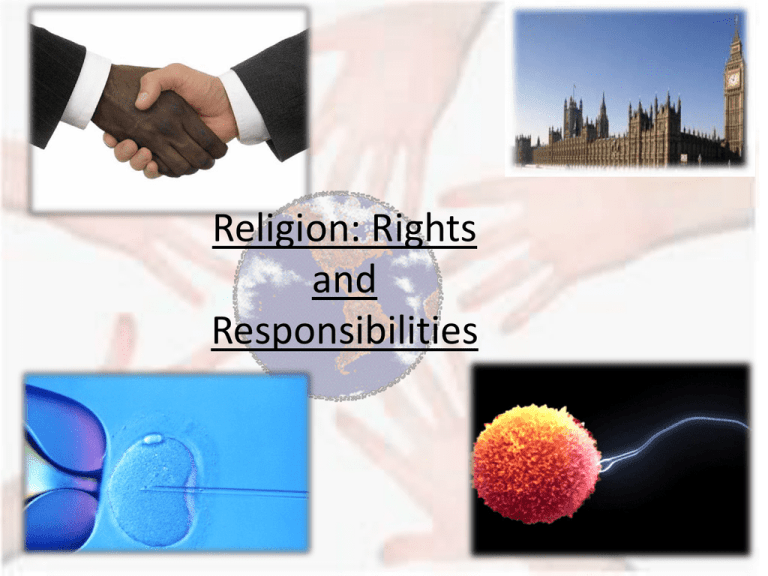
Religion: Rights and Responsibilities Key Words Bible - Decalogue - The holy book of Christians The Ten Commandments Making Moral Decisions – the Bible Many Christians use the Bible when making a moral decision because… o They believe it is the word of God dictated to the Bible writers. It is God’s guidance to human and has absolut authority in decision making. o Contains the teachings of Jesus on how to live. They should follow his teachings about moral decision making e.g. the Sermon on the Mount is Jesus explaining the Ten Commandments. Making Moral Decisions – the Bible • Bible records events of Jesus’ life. Christians ask how Jesus would act in certain situations and follow his example. As God’s son his example is the best to follow. • All Christians use the Bible as a basis for making moral decisions as it contains God’s teaching on how to behave e.g. the 10 Commandments (The Decalogue) Making Moral Decisions – the Bible Not all Christians agree as to how important the Bible when making moral decisions. Some say the Bible was written by humans INSPIRED by God as such it reflects the knowledge of a particular time and needs to be revised for today’s society. Some use the Church to tell them what the Bible means for today so they put the authority of the church above the Bible. Making Moral Decisions – the Church The Church: ‘The community of Christian believers (with a small ‘c’ it means a Christian place of worship).’ Church leaders are given a responsibility of expanding on the meaning of the teaching held in the Bible and relating that to modern life. This is because… Making Moral Decisions – the Church • The church is the body of Christ = how Jesus works in the world. It has the same authority as Jesus. • Most Christians believe that God still speaks today through the church. • If individuals were to make their own decisions then there would be lots of different opinions about how to behave. By following Church guidance people can be sure they are doing the right thing. Making Moral Decisions – the Church The Catholic Church • The Pope is believed to have been selected by God so has supreme authority. He and the Council of Bishops, authorise teaching on moral and religious issues to Catholic Christians. Making Moral Decisions – the Conscience Conscience: ‘An inner feeling of the rightness or wrongness of an action.’ St Paul and St Thomas Aquinas taught that Xians should use their conscience as the final part of moral decision making. You should consider the Bible and the Church but your conscience should finalise any decision you make. Making Moral Decisions – the Church Christians believe God speaks to them. To them the voice inside is God and so they should follow what it asks of them. Church says Christians should follw their conscience and they are meant to follow the teachings of the church. Teachings of the Church and Bible do not come directly from God and need interpreting. However, the conscience is od speaking directly to individuals and should be followed. Why some Christians do not always follow their conscience • Some have been mistaken about the voice of God. Peter Sutcliffe became known as the Yorkshire Ripper. He claimed that God told him to kill prostitutes. • Some fundamentalist Christians have claimed God had told them to kill doctors who carry out abortions. Why some Christians do not always follow their conscience • If everyone followed their conscience we would have no agreement in society on what is right. •Many Christians believe that if they follow the Bible and the teaching of the church then they should not go wrong and do not need the conscience to be the final word. Moral Decision Making – Situation Ethics Situation Ethics: ‘The idea that Christians should base moral decisions on what is the most loving thing to do.’ Joseph Fletcher was a Christian ethicist who wrote the book ‘Situation Ethics’ in 1966. Moral Decision Making – Situation Ethics He said that Biblical rules should be taken in consideration only with other, greater rules, in mind. Fletcher stated: Saw the Bible and Church as stating what is right or wrong but to him life was not like that. Bible says it is wrong to steal but what if a mad man had a nuclear weapon? He based decisions on Jesus’ commandment to ‘love your neighbour’. This allowed flexibility and the chance to adapt it to all situations. Why some Christians use Situation Ethics • Jesus seemed to follow situation ethics when he over ruled parts of the Old Testament he saw as unloving e.g healed a paralysed man on the Sabbath (which was banned). • Should be aware of the consequences of your actions and so you should only do what will produce good results. • Jesus said the only laws are to love God and your neighbour. You should do what will have the most loving results. • See Christianity as based on love and forgiveness. Should make decisions based on love, not laws. Why some Christians DO NOT use Situation Ethics • God would not have given laws in the Bible if they were not meant to be followed. So they follow the Bible when making decisions. • Should follow what all Christians believe is the right way to live e.g. 10 Commandments, rather than relying on their own ideas. • Think the Church knows better what Christians should do rather than the individual, so they follow the Church. Why some Christians DO NOT use Situation Ethics • They claim you can never know all the facts about a situation and so do not know all of the consequences e.g. Can save the life of an old man or a mother of 3? Situation ethics would save the mother. What if you discover that the mother is a murderer and the old man was about to find the cure for cancer? The results of this situation are now changed once again. Why some Christians use a number of authorities in making moral decisions Some may usually use only one authority but may use others in complicated cases because… • Protestants might usually use the Bible as it is straightforward to use. However, for a modern situation e.g. contraception it is hard to use just the Bible. They may see what the church says or listen to their conscience. Why some Christians use a number of authorities in making moral decisions • Catholics would follow the authority of the church as it interprets the Bible. The church is against contraception but through situation ethics a Catholic might think it right for people in Africa to be allowed to use condoms to stop the spread of AIDS. All these rights are declared to be for all people for all time. • The right to life. No one has the right to end your life. • Freedom from inhuman treatment. Torture is banned. • Freedom from slavery. Forced labour is outlawed. • Right to liberty. Everyone has the right to do what they want if it is not against the law. • Right to a fair trial. Under UK law. • Retrospective penalties. You cannot be charged with a crime if it wasn’t a crime when you did it. • Privacy You right to your private life. • Freedom of conscience & religion. Hold the opinions and beliefs you want to without persecution. • Freedom of expression. Express your views so long as it doesn’t break the law. • Freedom of assembly. To gather with others and if necessary to demonstrate. • Marriage and family. To get married and have a family (within the rules of the law). • Freedom from discrimination. Not to be discriminated against for an reason. • The First Protocol (Civil Liberties). Have the right to own possessions, have an education and participate in the democratic process. Human Rights: The rights and freedoms to which everyone is entitled. In 1998 the UK passed the Human Rights Act giving UK citizens by law, the fundamental rights already laid out in the Universal Declaration of Human Rights and the European Union Charter of Fundamental Rights. Christians believe human rights are important because: However, the Act can cause problems for religious people. They believe in the Sanctity of Life as all are made in God’s image. Xians could break the Act if they refuse to support gay marriage. It is in line with Biblical teaching on how we should treat others. The Catholic church discriminates against women as priests. It allows for the freedom to have a religion and meet together. Some Christians feel homosexuals should not adopt children. It outlaws discrimination against Christians and others. Xian groups could break the Act by refusing to give a non-Xian a job. Why we should take part in democratic and electoral processes Democratic processes The ways in which all citizens can take part in government (usually through elections). Electoral processes The ways in which voting is organised Political party A group which tries to be elected into power on its policies e.g. Labour Pressure group A group formed to influence government policy on a particular issue Why we should take part in democratic and electoral processes As a democracy every UK citizen over 18 can vote for; MPs who sit in the House of Commons Local councillors MEPs (Member of the European Parliament) Every UK citizen over 21 can be a candidate in any of these elections. Why we should take part in democratic and electoral processes Every citizen has the right to try and change the policies of the government or local council by; • joining or forming a political party • joining or forming a pressure group • having a meeting with their MP or councillor. Why we should take part in electoral processes. Many people feel that as a citizen of a country you not only have a right to have your say, but you have a responsibility to take part in the electoral process (voting) and the democratic process (citizens choosing and influencing Parliament). They think this because... It gives you more control over local issues that affect you on a day to day basis. In the past, people died fighting for our right to choose those who govern us. We owe it to these men and women to use these rights. National government make new laws that affect your life. You have a say in these laws. National government are responsible for many things. You have a say in the decisions made. Decisions in Europe affect UK laws. We need to elect people who will speak out for us. The term ‘democracy’ means ‘a government of the people, by the people, for the people’ . National government sets our taxes to raise money and chooses how our money is then spent. How can you complain if you don’t use your right to have your say? Not all countries have a democracy, their citizens have no say over how the country is run or who will lead them. Christian Teachings on Moral Duties and Responsibilities Golden Rule The teaching of Jesus that you should treat others as you would like them to treat you. Social change The way in which society has changed and is changing (and also the possibilities for future change). Christian Teachings on Moral Duties and Responsibilities Christians believe they should take part in democratic processes. Many Christians believe they should bring about social change so that society becomes truly Christian. The main teachings that guide Christians in this are… Christian Teachings on Moral Duties and Responsibilities 1) The Golden Rule. (Matt 7:12) ‘So in everything, do to others as you would have them do to you, for this sums up the Law and the Prophets.’ When voting Christians will look at policies and see how they will affect other people and see if they would be happy being treated that way e.g. a party wants to cut benefits for the disabled. A Christian would ask if they would be happy if that happened to them. Christian Teachings on Moral Duties and Responsibilities 2) The Parable of the Sheep and the Goats. (Matt 25:31-46) ‘Whatever you did not do for the least of my people you did not do for me.’ Jesus said it was a Christian’s duty to help the poor and hungry. Again this would force a Christian to look at the policies of a candidate. If they wanted to imprison homeless people they would not vote for them as it is not helping them. The bad/unrighteous The good/righteous GOATS SHEEP Didn’t give food Gave food Didn’t give drink Gave drink Didn’t give shelter Gave shelter Didn’t give clothes Gave clothes Didn’t look after the sick Looked after the sick Didn’t visit those in jail Visited those in jail Christian Teachings on Moral Duties and Responsibilities 3) ‘Am I my brother’s keeper?’ (Gen.4) Abel kills his brother Cain. God asks him where Abel is and Cain replies with this quote. God punishes Cain by making him become a homeless wanderer. This shows God wanted us to look after each other (be ‘my brother’s keeper’. As such a Christian would vote for people trying to look after those in need. Genetic Engineering: The deliberate alteration of a person by manipulating its genetic framework in order to cure or prevent diseases and disabilities in human beings. Most genetic research is based on two methods: Gene Therapy: This enables changes to be made to cells that pass on defective information from one generation to the next, allowing permanent changes to be made. Stem Cell Research is the most recent form of genetic research. Stem cells are the ‘ building blocks of life’ and can be used to create (clone) new organs or cells to replace diseased ones. They are ‘harvested’ from either embryos created by in-vitro fertilisation (IVF) , bone marrow or blood. PGD: Pre-implantation Genetic Diagnosis. This removes defective genes from embryos so women at risk of passing on diseases can produce healthy babies. Some people believe this will eventually lead to us picking and choosing any characteristic of a child including gender, eye and hair colour, even their sexual orientation. The Human Genome Project plans to map out the complete human genetic outline. It is believed if we can identify every human gene, then we can remove the defective ones, replace them with healthy ones, and eradicate illnesses completely. Stem cell research is illegal in the United States of America. However, it has been legal in the UK since February 2001 under certain conditions, regulated by the Human Fertilisation and Embryology Authority In May 2008 the UK government made it possible for scientist to use ‘cybrids’ for research. That is; a human nucleus (the inside of a human embryo) implanted in to an animal egg, to create a new embryo for DNA research into causes and cures for diseases. From this research, scientist have found out how to reproduce human organs. They believe that they will eventually be able to recreate all human tissue and organs to help replace diseased kidneys, livers, lungs and even hearts. It may one day be possible to recreate a complete human being. • Stem cell research, genetic engineering and cloning, offer the prospect of cures for currently incurable diseases. • It is available in some countries and so is only available to the rich who can afford to travel and pay medical bills. • Cloning has been used to grow healthy cells to replace malfunctioning ones. • Genetic research is a vital tool in medical science, it would be wrong to ignore the advantages genetic engineering can bring. • The laws on what can be done are strictly monitored to protect from abuse. • Genetic engineering treats the human body as a commodity to be manipulated no different to plants. • Once started there is no going back, scientist will be able to reproduce scientifically created human beings. •There is no information about the long term consequences. • The process is irreversible so if anything went wrong it would be permanent. • It opens the way for genetic screening where people could be checked for likely illnesses before getting jobs or life insurance. Different Christian attitudes to genetic engineering Some (mainly liberal Protestants) believe genetic engineering is fine if it is to cure disease, but not to create the perfect human. They support it because… • Jesus was a healer who encouraged his followers to cure the sick. • An embryo is not considered regarded as a potential life until it is 14 days old. • Being responsible stewards includes improving the lives of others with the scientific knowledge God has allowed us to gain (or given to us). •Liberal Christians will accept most of the secular arguments for genetic engineering. Different Christian attitudes to genetic engineering Some Christians, mainly Catholics, allow GE if it is to cure diseases and does not use human embryos because… • Life begins at conception, be it in the womb or a glass dish. • Killing an embryo is taking a human life which is banned by in the Bible and by the Church. Different Christian attitudes to genetic engineering Some Christians are opposed to any forms of genetic research at all. They believe this because… • God has created the genetic makeup of a child for people to overrule that would be to interfere with God’s plans. • They accept the nonreligious arguments against genetic engineering. • Cloning or creating a life is taking the role of Creator which is God’s role.


